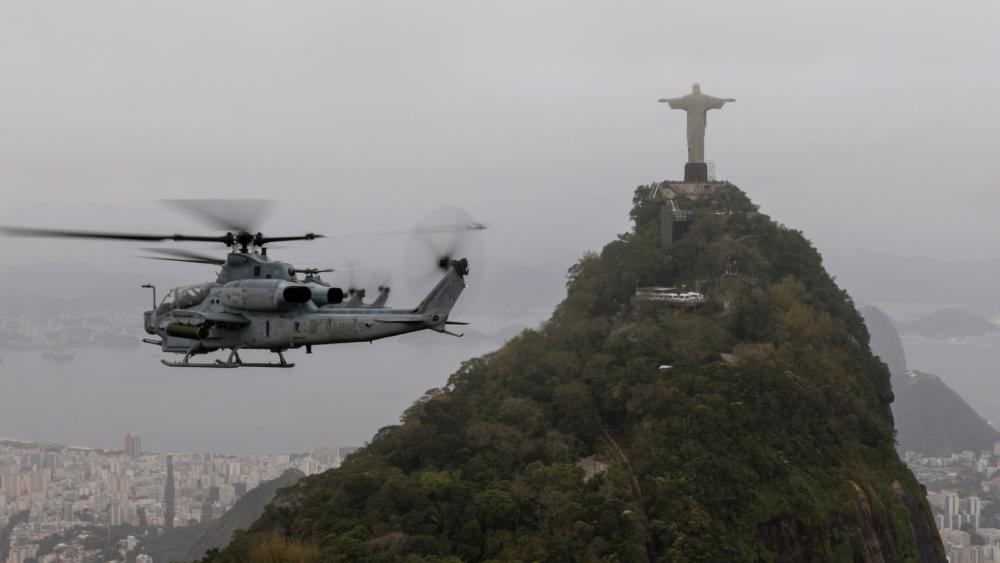In and off the coast of Brazil – Marine Light Attack Helicopter Squadron (HMLA) 773, known as Red Dog, supported Exercise UNITAS LXIII (63) in Brazil as the Aviation Combat Element of Special Purpose Marine-Air Ground Task Force-UNITAS from 8-22 September 2022. Hosted this year by Brazil and facilitated by U.S. Naval Southern Forces Command/U.S. 4th Fleet and U.S. Marine Corps Forces, South, this annual exercise trains forces to conduct joint maritime operations through the execution of anti-surface, anti-submarine, anti-air, amphibious, and electronic warfare operations that enhance warfighting proficiency and increase interoperability among participating navy and marine forces.

The Red Dogs are a Marine Corps Reserve squadron consisting of AH-1Z Viper attack helicopters, commonly referred to as Cobras, and UH-1Y Venom utility helicopters, commonly referred to as Hueys or “War Pigs.” The squadron is based at Joint Base McGuire-Dix-Lakehurst, New Jersey. Red Dog also has a detachment based at Naval Air Station Joint Reserve Base New Orleans. The UH-1Y Venom is a twin-engine, medium-sized utility helicopter used for reconnaissance, troop insert, and close air support. The AH-1Z Viper is a twin-engine attack helicopter that provides direct close air support for ground troops as well as armed escort and anti-tank missions. The Red Dogs supported multiple missions during UNITAS alongside partners from Brazil, Colombia, Ecuador, Paraguay, and Uruguay.

Marine Wing Support Squadron (MWSS) 772, a support element to the ACE, facilitated Red Dog operations by establishing a forward arming and refueling point (FARP) at Santa Cruz Air Force Base. The Marines of MWSS-772 at the FARP refueled and armed the Red Dog helicopters daily as each touched down in Santa Cruz, and often conducted operations alongside Brazilian marines. FARPs are established to refuel and arm military aircraft at a position closer to their area of operations than their main operating base. These positions allow for longer time on station as well as a faster turnaround for re-arming during sustained operations. FARPs are typically temporary, can rapidly deploy, and are highly mobile.

During the exercise, Brazilian marines integrated with MWSS-772 Marines by training together and conducting refueling operations on Red Dog helicopters. The combined support team also facilitated “hot loads” meaning rockets are rapidly reloaded on the helicopter while the rotors are spinning, thereby allowing the Marines return to action faster. During exercise UNITAS LXIII, one ACE mission included parachute operations from the UH-1Y Venom helicopter where marines from Brazil, Colombia, Ecuador, Paraguay, and Uruguay joined U.S. Marines to conduct static-line jumps from a lower altitude of 1,500 feet and free-fall jumps from 8,500 feet. Beforehand, Marine pilots and jumpmasters met with partner nation counterparts to work through common operational practices and signals while conducting these jumps.

Over the course of two days of parachute operations, Marines from 3rd Force Reconnaissance Company, 4th Marine Division conducted 22 free-fall jumps from Red Dog UH-1Y Venom helicopters as well as Brazilian UH-15 Super Cougar helicopters. Additionally, partner nation forces conducted 30 military free-fall jumps and 24 low-level static-line jumps.Red Dog also supported training events with teams of Joint Terminal Air Controllers from 3rd Force Reconnaissance Company and Brazilian marines with their Air Combat Battalion, working together to call in close air support from U.S. AH-1Z Vipers and UH-1Y Venom helicopters with the Red Dogs as well as Brazilian UH-12 Esquilo helicopters and A-4 Skyhawk jet fighters.

Over three days, the combined JTAC team from the U.S. and Brazil controlled multiple partner nation aircraft while using their own communication equipment. This was a significant event to showcase interoperability between the two nations and control aircraft conducting close air support operations while firing a variety of munitions including rockets, aircraft guns, and crew-served weapons. After the completion of the exercise, the Red Dogs retrograded helicopters and personnel aboard amphibious transport dock ship USS Mesa Verde (LPD 19) to begin the journey home. UNITAS, Latin for “unity,” is the world’s longest-running multinational maritime exercise that develops and sustains relationships to improve the capacity of our reemerging and enduring maritime partners to achieve common objectives.
















